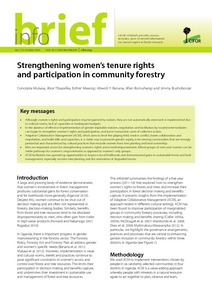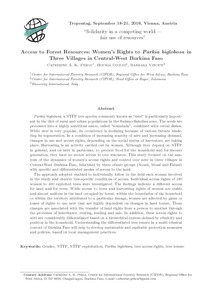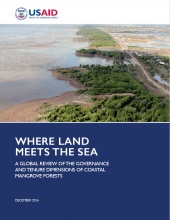Focal point
Location
The Center for International Forestry Research (CIFOR) is a non-profit, scientific facility that conducts research on the most pressing challenges of forest and landscapes management around the world. With our global, multidisciplinary approach, we aim to improve human well-being, protect the environment, and increase equity. To do so, we help policymakers, practitioners and communities make decisions based on solid science about how they use and manage their forests and landscapes.
Capacity building, collaboration and partnerships are essential to finding and implementing innovative solutions to the challenges that the globe faces. We are proud to work with local and international partners. We are a member of the CGIAR Consortium and lead the CGIAR Research Program on Forests, Trees and Agroforestry.
Our headquarters are in Bogor, Indonesia. We have offices in 8 countries across Asia, Latin America and Africa, and we work in more than 30 countries. Contact us for more information.
Resources
Displaying 91 - 95 of 808Strengthening women’s tenure rights and participation in community forestry
Dynamics of ecosystem services during forest transitions in Reventazón, Costa Rica
The forest transition framework describes the temporal changes of forest areas with economic development. A first phase of forest contraction is followed by a second phase of expansion once a turning point is reached. This framework does not differentiate forest types or ecosystem services, and describes forests regardless of their contribution to human well-being. For several decades, deforestation in many tropical regions has degraded ecosystem services, such as watershed regulation, while increasing provisioning services from agriculture, for example, food.
Access to forest resources: women's rights to Parkia biglobosa in three villages in Central-West Burkina Faso
Parkia biglobosa, a NTFP tree species commonly known as "néré" is particularly important in the diet of rural and urban populations in the Sudano-Sahelian zone. The seeds are processed into a highly nutritious sauce, called "soumbala", combined with cereal dishes. While néré is very popular, its occurrence is declining because of various threats hindering its regeneration. In a condition of increasing scarcity of néré and increasing demand, changes in use and access rights, depending on the social status of harvesters, are taking place. Harvesting is an activity carried out by women.
Access right to food tree species: the case of women access to nere (Parkia biglobosa) in Central-West Burkina Faso
This paper first presents a clustering of women based on the characterization of their distinct access rights to néré. Secondly, the types of access rights are characterized also in spatial terms, based on the type of land use where the women harvesting is exercised.
WHERE LAND MEETS THE SEA
This report provides a synoptic analysis of the legal and governance frameworks that relate to the use and management of mangrove forests globally. It highlights the range of challenges typically encountered in the governance and tenure dimensions of mangrove forest management. This assessment forms part of a broader study that includes national-level assessments in Indonesia and Tanzania. It was carried out under the USAID-funded Tenure and Global Climate Change Program.







